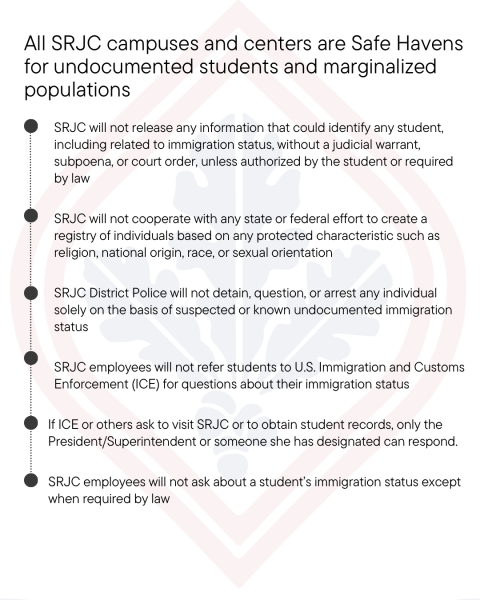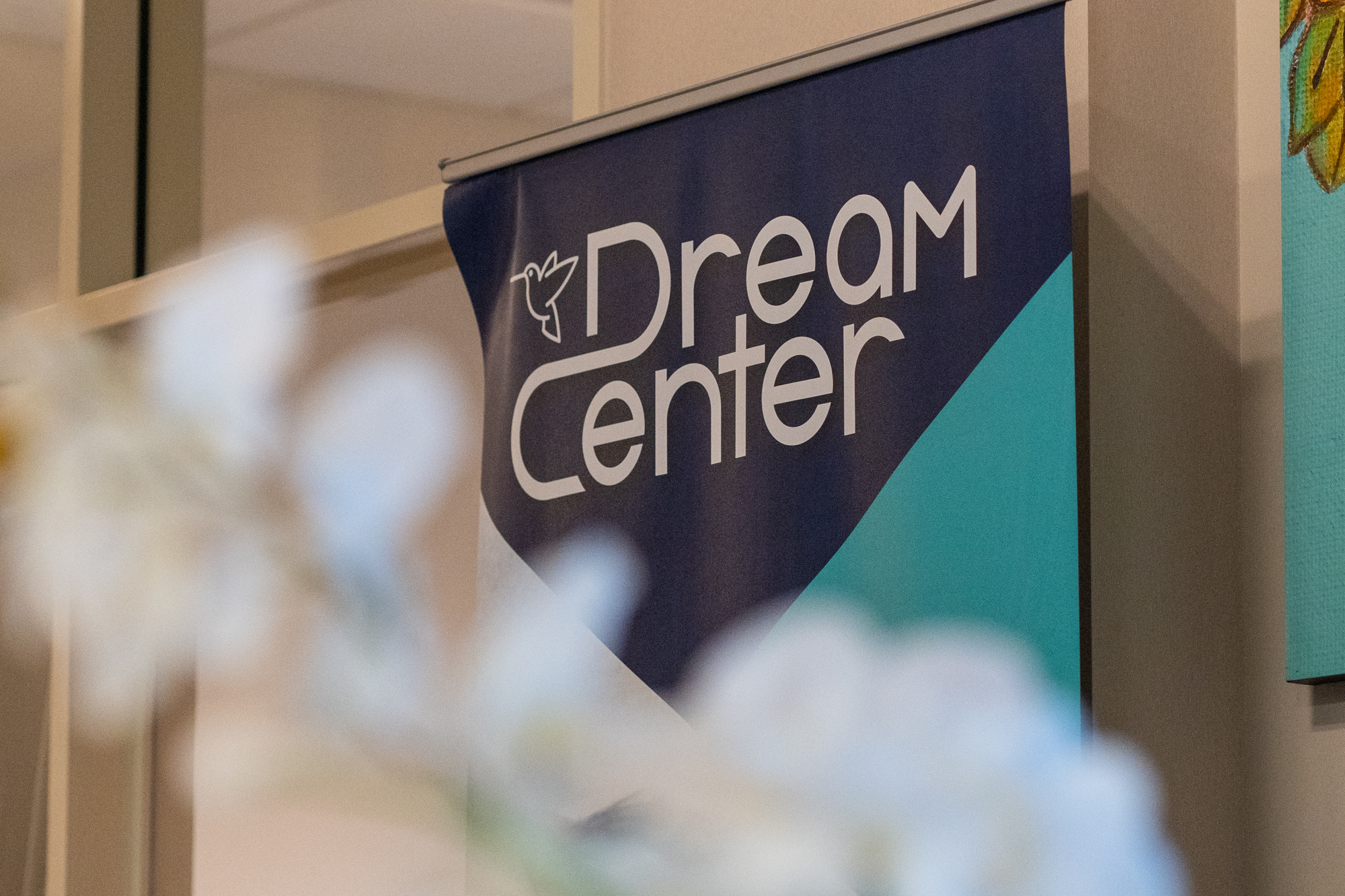Santa Rosa Junior College administration affirmed its efforts to assuage student, faculty and staff anxiety in response to the Trump administration’s aggressive agenda against immigrants.
In his first week in office, President Donald Trump has already begun acting on his campaign promise to enforce “the largest domestic deportation operation in American history.”
On Jan. 21, following Trump’s inauguration, Benjamine Huffman, acting Department of Homeland Security secretary, rolled back the Biden Administration’s 2021 protections of “sensitive” areas – churches, schools and hospitals.
“Criminals will no longer be able to hide in America’s schools and churches to avoid arrest,” a DHS spokesperson said in a statement released Jan. 21. College campuses are no longer protected under the 2021 guidelines.
SRJC administration has been preparing its response since November
College campuses may no longer be a safe haven from immigration raids, but SRJC officials are working to shore up protections for students, staff and faculty members of immigrant communities.
“I’m always triggered by what it means to feel like there is an outward aggressive nature and attack on particular populations in our country,” said SRJC President Angélica Garcia on Monday in a conversation with The Oak Leaf.
Under the new administration, she said, “I need to be much more aware and vigilant of the things that are coming through that specifically impact community college students.”
Garcia starts each day by reviewing the latest White House executive orders and filters the information in terms of direct impacts to SRJC, asking herself: “What are they communicating, and what are the parameters and how it intersects with what we need to do here at SRJC.”
But well before the inauguration, the SRJC president’s office reaffirmed its position to support all students.
“SRJC remains steadfast in its commitment to providing a safe environment for all students and employees,” President Garcia said Nov. 12, 2024 in a statement to The Oak Leaf. She directs anyone with questions about ICE or immigration requests to contact the SRJC president’s office.
Immigration data analysts estimate there are nearly 408,000 undocumented college students nationwide. About 60,000 undocumented college students attend California’s public campuses and roughly 45,711 attend California Community Colleges, as reported by CalMatters.
The SRJC Dream Center serves immigrant and undocumented students to ensure their continued access to higher education and that they know their rights. The center houses Vital Immigrant Defense Advocacy and Services (VIDAS), which offers free immigration legal counsel for students, staff and faculty at SRJC. The center also provides undocumented students health and college support and helps with DACA renewals.
According to multiple faculty, staff and club representatives, many students of immigrant communities do not feel safe speaking about this topic.
On Jan. 24, former SRJC student Mateo Prusky posted messages on the SRJC app student forum encouraging students to report immigration violations, which elicited responses supporting immigrants’ rights and messages of inclusivity. The post encouraging reporting immigration violations was removed because Prusky is not an actively enrolled student.
Rafael Vazquez Guzman, SRJC humanities and religious studies emeritus instructor, suggested that the climate of fear created by the original poster may result in silencing students.
Other students describe the campus climate as welcoming. First-year student Aurora Perales says she has not encountered any negativity as a Chicana-American student at SRJC. However, she does acknowledge that she may be somewhat sheltered, as most of her friends are first-generation Americans, like herself, and because most of her classes are online.
“The teachers I’ve interacted with are generally quite progressive and open minded and supportive,” Perales said.
But she has major concerns about what could happen, having experienced Trump’s first presidency and because “things are escalating with Trump’s current term.” As a member of an immigrant community, she worries about her friends and family members. Perales was born in the U.S. to an American mother and Mexican father and is a U.S. citizen.
“I fear sometimes for my family members, because they [ICE] could potentially revoke your status, depending on if your residency is up to date, if you don’t have the proper papers on you, or if you perhaps committed a crime,” she said. “[The] persecution [of immigrants] at the moment is frightening, not just at the SRJC, but in Santa Rosa and Sonoma County in general.”
Civil engineering student Esperanze Marquez, also a first-generation student at SRJC, feels SRJC provides a diverse community. She values the AVANZADO, MESA, and HOPE programs housed on the first floor of the Lindley Center. “I’m in there almost 24/7,” she said. But outside of that protected space, she feels less support.
“There are a few people who I feel like do not target, but are more negative towards the immigrant community since the start of the year,” Marquez said.
A more general concern for Marquez is the effect of Trump’s scare tactics on enrollment.
“I get worried that our campus would diminish in size, or the student population itself, just because people are afraid, even though the JC has measures in place to keep students safe,” she said.“I know multiple students have not come to school last week because they’re afraid that campus isn’t safe or going to school isn’t safe enough for them, like coming back to school or going home, it’s not safe for them.”

SRJC aligns its policies with California’s broad protections for immigrants
In 2017, Governor Newsom signed the sanctuary bill that limits how state and local law enforcement agencies can cooperate with immigration authorities, commonly referred to as “ICE,” Immigration and Customs Enforcement. This law states police cannot be deputized as immigration agents and stops state and local police from asking individuals about their immigration status. In other words, local police cannot automatically hand people over to immigration authorities.
In February 2017 the Santa Rosa City Council passed a resolution to designate the city as a safe haven. In November 2024, the Santa Rosa City Police Department issued a statement communicating that the department does not participate in federal immigration enforcement and that its policies align with state laws designating the state a safe haven. Police are also required to inform individuals of their rights before an ICE agent interview and are blocked from stopping someone based on immigration status.
In December 2024, Santa Rosa City Schools reaffirmed its commitment to being a safe haven and planned for school employee training for how to respond to immigration authorities.
Santa Rosa Junior College also identified itself as a safe haven at the start of Trump’s first presidency. The administration outlined a series of actions and protocols to protect the district’s immigrant students, staff and faculty. At the time, the district affirmed its commitment to admit and advocate for all students and that it would not release any personal student information, including anything related to immigration status, unless requested by the student or required by law.
In addition, the district guaranteed that the SRJC District Police would not detain, question, or arrest anyone solely for immigration status.
“We have a police department – that’s our JC Police Department – fully fledged public service, and we’re clear that they will not participate in detaining or questioning or any kind of supporting potential ICE activities on our campuses,” President Garcia said Monday.
In 2017, and presently, the SRJC administration clarified that SRJC employees should not refer students to any ICE authorities and that it would provide training for employees to support marginalized communities.
President Garcia reaffirmed her commitment to these policies in a Nov. 13 message to the campus community following the presidential election.
In January, SRJC District Police Chief Robert Brownlee told The Oak Leaf that if ICE asks for identification papers, they have the right to ask if they are being detained. If not, they can walk away.
This spring, the district will offer several immigration-related training workshops for faculty and staff on its Feb. 13 Professional Development Activity Day.
Although campus and local police do not have to comply with ICE, immigration authorities retain the right to come onto campus and enter public spaces without a warrant. However, what constitutes a public space on campuses remains murky to many college administrators, as reported by Inside Higher Ed.
Vice President of Academic Affairs Robert Holcomb has been sending communications to faculty about SRJC protocols surrounding ICE presence on campus.
And faculty have reached out to President Garcia for clarification, asking if their classroom is considered an open public space. “Absolutely not,” she said she told them. “It is a teaching and learning space, no one can just come in without a warrant.”
This aligns with guidelines released by California Attorney General Rob Bonta in December 2024.
“Students need to know that we will continue to do what we need to do to support them being able to feel safe here, to complete their courses,” Garcia said.
While she recognizes the scrutiny that California, and by extension, the SRJC will be under, she affirmed, that “within our [Board of Trustees’] leadership and the way that they support policies and procedures, with our district leadership, with the way that faculty and staff are coming together to say, ‘How can we get as informed as possible so we can support students?’ I believe that we’ll be able to weather that [scrutiny].”

Immigration attorneys encourage students with DACA status to renew as soon as possible
Trump’s stated intention to end the Deferred Action for Childhood Arrivals program, or DACA, may also impact some SRJC students.
Julie Cyphers, immigration attorney with VIDAS, has an office in the Dream Center in Bertolini Hall. The Sonoma County nonprofit organization has worked with SRJC since 2019 to handle immigration cases for students, faculty and staff.
Under the second Trump presidency, “We’ll be here just doing the same type of work,” she said. “What we don’t know is whether they’re going to follow through on those threats or what that might look like. So I think we’re just trying to be prepared to respond in whatever way.”
Depending on the steps the administration takes, such as a large-scale deportation effort, Cyphers and VIDAS intend to respond, and may end up representing individuals facing removal. “We just don’t know what those will be, so we’re just ready to respond to whatever sort of whatever happens,” she said.
The previous Trump administration tried and failed to terminate the DACA program. Because DACA status is granted in two-year increments, anyone with DACA status that might expire in the next year may want to renew now, in anticipation.
According to Cyphers, there may be alternative routes for undocumented students or faculty. Each person’s immigration situation is determined case by case, so it’s important to speak with legal counsel to see what someone may qualify for.
“One of the common avenues is called Special Immigrant juvenile status, and that’s for young people under the age of 21 if they’ve been abused, abandoned or neglected by one or the other of their parents, then they can sometimes qualify for special immigrant juvenile status,” said Cyphers. Another potential option is a humanitarian visa.
Her office is busy, but Cyphers feels that she and her colleagues are able to handle the workload. “One perspective that I have is that we did live through this before, and there were a lot of threats about mass deportations and things like that, and we did not see that happen,” she said. “What’s important is I talk to students about knowing their rights, so that they’re prepared from that perspective if something were to happen.”
Perales, the first year and first-generation student, has bigger hopes. “I hope that, if anything, the SRJC will become more steadfast in their stance against all this really regressive legislation.”
Marquez feels confident that the SRJC community will do just that. “I know that regardless of everything, we have the right people, the right group of students that are willing to step up and take on this role and make sure that our community is heard and guided during this time,” she said.







